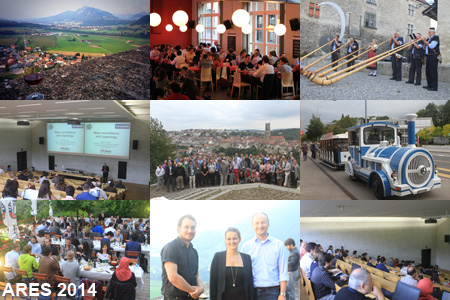The 7th International Workshop on Digital Forensics
to be held in conjunction with the 9th International Conference on Availability, Reliability and Security
(ARES 2014 – http://www.ares-conference.eu)
8th – 12th September 2014
University of Fribourg, Switzerland
Fribourg, Switzerland
Digital forensics is a rapidly evolving field primarily focused on the extraction, preservation and analysis of digital evidence obtained from electronic devices in a manner that is legally acceptable. Research into new methodologies tools and techniques within this domain is necessitated by an ever-increasing dependency on tightly interconnected, complex and pervasive computer systems and networks. The ubiquitous nature of our digital lifestyle presents many avenues for the potential misuse of electronic devices in crimes that directly involve, or are facilitated by, these technologies. The aim of digital forensics is to produce outputs that can help investigators ascertain the overall state of a system. This includes any events that have occurred within the system and entities that have interacted with that system. Due care has to be taken in the identification, collection, archiving, maintenance, handling and analysis of digital evidence in order to prevent damage to data integrity. Such issues combined with the constant evolution of technology provide a large scope of digital forensic research. WSDF aims to bring together experts from academia, industry, government and law enforcement who are interested in advancing the state of the art in digital forensics by exchanging their knowledge, results, ideas and experiences.
The aim of the workshop is to provide a relaxed atmosphere that promotes discussion and free exchange of ideas while providing a sound academic backing. The focus of this workshop is not only restricted to digital forensics in the investigation of crime. It also addresses security applications such as automated log analysis, forensic aspects of fraud prevention and investigation, policy and governance.
Topics of interest comprise but are not limited to:
| Digital Evidence Network Forensics Anti Forensics Physical Memory Acquisition and Analysis Digital Forensic Information Visualisation Fraud Investigations Involving Technology Portable Devices |
Cyber Terrorism Log Analysis Risk and Incident Management Investigative Case Studies Data Hiding Techniques and Steganography Novel Data Recovery Techniques Cyber Crime Digital Profiling |
Important Dates
| Submission Deadline | |
| Author Notification | May 21st, 2014 |
| Author Registration | June 10th, 2014 |
| Proceedings Version | June 20th, 2014 |
| Conference | September 8th – 12th, 2014 |
Workshop Chairs
Richard Overill (Chair)
King’s College London, UK
richard.overill[at]kcl.ac.uk
Martin Mulazzani (Co-Chair)
SBA Research, Austria
mmulazzani[at]sba-research.orgImportant Dates
Program Committee (tentative)
Aswami Ariffin, CyberSecurity Malaysia and University of South Australia
Aniello Castiglione, University of Salerno, Italy
Raymond Choo, University of South Australia
Kam-Pui Chow, Hong Kong University
Simson Garfinkel, Naval Postgraduate School, United States of America
Chris Hargreaves, Cranfield University, UK
Katharina Krombholz, SBA Research, Austria
Grant Osborne, University of South Australia
Vassil Roussev, University of New Orleans, United States of America
Matthew Simon, University of South Australia, Australia
Robert Taylor, South Australian Police, Australia
Simon Tjoa, St. Pölten University of Applied Sciences, Austria
Vrizlynn Thing, National University of Singapore
Benjamin Turnbull, Defence Science Technology Organisation, Australia
Hein Venter, University of Pretoria, South Africa
Stefano Zanero, Politecnico di Milano, Italy
Clara Maria Colombini, University of Milan, Italy
Antonio Colella, Italian Army, Italy
Submission
The submission guidelines valid for the WSDF workshop are the same as for the ARES conference. They can be found >>here<<.




